- Home
- Cory Doctorow
Rapture of the Nerds
Rapture of the Nerds Read online
Rapture of the Nerds
Cory Doctorow
Charles Stross
The Rapture of the Nerds
by Cory Doctorow and Charles Stross
READ THIS FIRST
This book is distributed under a Creative Commons Attribution-NonCommercial-NoDerivs 3.0 license. That means:
You are free:
to Share—to copy, distribute and transmit the work
Under the following conditions:
Attribution. You must attribute the work in the manner specified by the author or licensor (but not in any way that suggests that they endorse you or your use of the work).
Noncommercial. You may not use this work for commercial purposes.
No Derivative Works—You may not alter, transform, or build upon this work.
For any reuse or distribution, you must make clear to others the license terms of this work. The best way to do this is with a link http://craphound.com/rotn
Any of the above conditions can be waived if you get our permission
More info here: https://creativecommons.org/licenses/by-nc-nd/3.0/
See the end of this file for the complete legalese.
THE COPYRIGHT THING
What Cory Says:
The Creative Commons license at the top of this file probably tipped you off to the fact that I've got some pretty unorthodox views about copyright. Here's what I think of it, in a nutshell: a little goes a long way, and more than that is too much.
I like the fact that copyright lets me sell rights to my publishers and film studios and so on. It's nice that they can't just take my stuff without permission and get rich on it without cutting me in for a piece of the action. I'm in a pretty good position when it comes to negotiating with these companies: I've got a great agent and a decade's experience with copyright law and licensing (including a stint as a delegate at WIPO, the UN agency that makes the world's copyright treaties). What's more, there's just not that many of these negotiations—even if I sell fifty or a hundred different editions of Context (which would put it in top millionth of a percentile for reprint essay collections), that's still only a hundred negotiations, which I could just about manage.
I hate the fact that fans who want to do what readers have always done are expected to play in the same system as all these hotshot agents and lawyers. It's just stupid to say that an elementary school classroom should have to talk to a lawyer at a giant global publisher before they put on a play based on one of my books. It's ridiculous to say that people who want to "loan" their electronic copy of my book to a friend need to get a license to do so. Loaning books has been around longer than any publisher on Earth, and it's a fine thing.
Copyright laws are increasingly passed without democratic debate or scrutiny. In Great Britain, where I live, Parliament recently passed the Digital Economy Act, a complex copyright law that allows corporate giants to disconnect whole families from the Internet if anyone in the house is accused (without proof) of copyright infringement; it also creates a "Great Firewall of Britain" that is used to censor any site that record companies and movie studios don't like. This law was passed in 2010 without any serious public debate in Parliament, rushed through using a dirty process through which our elected representatives betrayed the public to give a huge, gift-wrapped present to their corporate pals.
It gets worse: around the world, rich countries like the US, the EU and Canada have been negotiating a secret copyright treaty called "The Anti-Counterfeiting Trade Agreement" (ACTA) and "Trans-Pacific Partnership" (TPP) that have all the problems that the Digital Economy Act had and then some. The plan was to agree to this in secret, without public debate, and then force the world's poorest countries to sign up for it by refusing to allow them to sell goods to rich countries unless the do. In America, the plan was to pass it without Congressional debate, using the executive power of the President. ACTA began under Bush, but the Obama administration has pursued it with great enthusiasm, and presided over the creation of TPP. The secret part of the plan failed—ACTA ran into heavy opposition in Congress and has been rejected by Mexico and the European Parliament—but the treaty isn't dead yet, has supporters on both sides of the house who keep attempting to bring it back under a new name. This is a bipartisan lunacy.
So if you're not violating copyright law right now, you will be soon. And the penalties are about to get a lot worse. As someone who relies on copyright to earn my living, this makes me sick. If the big entertainment companies set out to destroy copyright's mission, they couldn't do any better than they're doing now.
So, basically, screw that. Or, as the singer, Wobbly and union organizer Woody Guthrie so eloquently put it:
"This song is Copyrighted in U.S., under Seal of Copyright #154085, for a period of 28 years, and anybody caught singin' it without our permission, will be mighty good friends of ourn, cause we don't give a dern. Publish it. Write it. Sing it. Swing to it. Yodel it. We wrote it, that's all we wanted to do."
What Charlie says:
Cory has covered the groundwork pretty well above, so I've got relatively little to add.
There's an old story about a couple of tourists who are on vacation in rural Ireland, and who get themselves lost. They've got a map but they can't figure out where they are (this is the pre-GPS era). Finally they come to a rural five-way crossroads, and a farmer with a herd of sheep. "Excuse me, my good man," says one of the tourists, "we're lost! Can you tell us how to get back to Dublin?" The farmer meditates for a minute, and then offers up his advice: "Sure I can, but if I were youse, I wouldn't start from here."
(Pre-emptive apology: This old story applies to just about all rural districts; it's just traditional to set it in Ireland. Please don't hurt me!)
Copyright puts us all in those tourists' shoes, and they pinch and they don't fit very well. If we were designing a rational rural road network for Ireland we wouldn't build anything resembling the shambolic mess of single-track routes that bamboozled those tourists. We'd design a neat network with good signage that lets people know where they are and where they need to go. Alas, we're stuck with what our ancestors have built.
Copyright wasn't designed to get in your face: it wasn't designed at all! Rather, it evolved over a period of centuries, from a tool of state censorship (you could prevent sedition by licensing big, heavy, old-fashioned metal-type printing presses) to a tool for revenue protection (Dickens and other Victorian writers were frequently on the edge of poverty because their works were copied without credit or royalty payment by any printer who could get their hands on them), and finally, recently, into a tool for rent-seeking by big corporations with paid lobbyists. Nobody in their right mind would have designed the current system—but we're stuck with it, largely because it's now a global mess, enshrined in law by international treaty: a many-headed hydra that would require broad international agreement in order to be replaced.
I am a copyright criminal, and so (in all probability) are you.
No, I'm not exaggerating. I will confess to having cracked the DRM lock on novels that I wrote, so that I could have my very own copy of the as-published text! That puts me in breach of the DMCA (in the United States) and the Copyright, Designs and Patents Act (in the United Kingdom, where I live). I've also cracked DRM on ebooks I bought so that I could read them on other devices. (Did I say "on ebooks I bought"? That's the problem: I paid for them, but I don't own them in the same way that I own a chunk of dead tree; the major ebook vendors insist that I'm merely paying a license fee to use the ebook, and that they retain ownership of it.) You may think that's hair-splitting, but it's an important point; if I complied with the letter of the law I wouldn't be able to use those ebooks after the ereader they
were licensed for died of old age (probably within a couple of years), but the mere fact of my having paid for those books doesn't entitle me (in the eyes of the law) to preserve them in a readable format.
This is an example of what Cory means when he says that copyright will ultimately make criminals out of all of us if we don't re-draw the boundary between the public domain and the private interest of everyone involved in copyright—from actual content creators to rent-seeking owners of the rights to stuff they've somehow acquired the legal title to.
I'm not encouraging you to make copies of stuff other people made and to sell them for a profit without giving payback to the original creators and the publishers who helped edit and produce the work. That's not cool, unless the creators explicitly said you could do that. But if your shoes pinch, it might be a sign that you need to try out a better-fitting pair, and we're trying to help with that.
ABOUT DERIVATIVE WORKS
Cory's previous books have been released under a slightly different Creative Commons license, one that allowed for derivative works (that is, new creative works based on this one). Keen observers will have already noticed that this book is licensed "NoDerivs"—that is, you can't make remixes without permission.
Cory says:
A word of explanation for this shift is in order. When I first started publishing under Creative Commons licenses, I had to carefully explain this to my editor and publisher at Tor Books. They were incredibly forward-looking and gave me permission to release the first-ever novel licensed under CC—my debut novel Down and Out in the Magic Kingdom. This ground-breaking step was only possible because I was able to have intense, personal discussions with my publisher.
My foreign rights agents are the inestimable Danny and Heather Baror, and collectively they have sold my books into literally dozens of countries and languages, helping to bring my work to places I couldn't have dreamed of reaching on my own. They subcontract for my agent Russell Galen, another inestimable personage without whom I would not have attained anything like the dizzy heights that I enjoy today. They attend large book fairs in cities like Frankfurt and Bologna in order to sell the foreign rights to my books, often negotiating with one of a few English-speakers at a foreign press, who then goes back and justifies her or his decisions to the rest of the company.
The point is that this is nothing like my initial Creative Commons discussion with Tor. That was me sitting down and making the case to editors I've known for years (my editor at Tor, Patrick Nielsen Hayden, has known me since I was 17). My foreign rights are sold by a subcontractor of my representative to a representative of a press I've often never heard of, who then has to explain my publishing philosophy to people I've never met, using a language I don't speak.
This is hard.
Danny and Heather have asked—not demanded, asked!—that I consider publishing books under a NoDerivs license, so that I can consult with them before I authorize translations of my books. They want to be able to talk to potential foreign publishers about how this stuff works, to give me time to talk with them, to ease them into the idea, and to have the kind of extended conversation that helped me lead Tor into their decision all those years ago.
And I agreed. Free/open culture is something publishers need to be led to, not forced into. It's a long conversation that often runs contrary to their intuition and received wisdom. But no one gets into publishing to get rich. Working in the publishing industry is virtually a vow of poverty. The only reason to get into publishing is because you flat-out love books and want to make them happen. People work in publishing for the same reason writers write: they can't help themselves.
So I want to be able to have this conversation, personally, unhurriedly, one-to-one. I want to keep all the people involved in my books—agents, subagents, foreign editors and their bosses—in the loop on these discussions. I will always passionately advocate for CC licensing in all of my work. I promise you that if you write to me with a request for a noncommercial derivative use, that I will do everything in my power to see that it is authorized.
And in the meantime, I draw your attention to article 2 of all Creative Commons licenses:
Nothing in this License is intended to reduce, limit, or restrict any uses free from copyright or rights arising from limitations or exceptions that are provided for in connection with the copyright protection under copyright law or other applicable laws.
Strip away the legalese and what that says is, "Copyright gives you, the public, rights. Fair use is real. Fair dealing is real. Decop minimum exemptions to copyright are real. You have the right to make all sorts of uses of all copyrighted works, without permission, without Creative Commons licenses.
Rights are like muscles. When you don't exercise them, they get flabby. Stop asking for stuff you can take without permission. Please!
(And, for the record, Charlie agrees.)
DONATIONS AND A WORD TO TEACHERS AND LIBRARIANS
Every time I put a book online for free, I get emails from readers who want to send me donations for the book. I appreciate their generous spirit, but I'm not interested in cash donations, because my publishers are really important to me. They contribute immeasurably to the book, improving it, introducing it to audiences I could never reach, helping me do more with my work. I have no desire to cut them out of the loop.
But there has to be some good way to turn that generosity to good use, and I think I've found it.
Here's the deal: there are lots of teachers and librarians who'd love to get hard-copies of this book into their kids' hands, but don't have the budget for it (teachers in the US spend around $1,200 out of pocket each on classroom supplies that their budgets won't stretch to cover, which is why I sponsor a classroom at Ivanhoe Elementary in my old neighborhood in Los Angeles; you can adopt a class yourself here).
There are generous people who want to send some cash my way to thank me for the free ebooks.
I'm proposing that we put them together.
If you're a teacher or librarian and you want a free copy of Rapture of the Nerds, email [email protected] with your name and the name and address of your school. It'll be posted to http://craphound.com/rotn/donate/ by my fantastic helper, Olga Nunes, so that potential donors can see it.
If you enjoyed the electronic edition of Rapture of the Nerds and you want to donate something to say thanks, go to http://craphound.com/rotn/donate/ and find a teacher or librarian you want to support. Then go to Amazon, BN.com, or your favorite electronic bookseller and order a copy to the classroom, then email a copy of the receipt (feel free to delete your address and other personal info first!) to [email protected] so that Olga can mark that copy as sent. If you don't want to be publicly acknowledged for your generosity, let us know and we'll keep you anonymous, otherwise we'll thank you on the donate page.
I've done this with eight of my titles now, and gotten more than a thousand books into the hands of readers through your generosity. I am more grateful than words can express for this—one of my readers called it "paying your debts forward with instant gratification." That's a heck of a thing, isn't it?
DEDICATIONS
Cory: For Alice. I renew my vow not to fork any new instances without your permission.
Charlie: For Feorag. Just because!
Acknowledgements: We'd like to thank the editors and agents who have helped this pantomime horse get up and dance: at various times, their number have included Ellen Datlow, Lou Anders, Patrick Nielsen Hayden—not to mention our agents Russ Galen and Caitlin Blasdell.
Jury Service
Huw awakens, dazed and confused.
This is by no means unusual, but for once Huw’s head hurts more than his bladder. He’s lying head down, on his back, in a bathtub. He scrabbles for a handhold and pulls himself upright. A tub is a terrible place to spend a night. Or a morning, come to think of it—as he blinks, he sees that it’s midafternoon, and the light slanting in through a high window limns the strange bathroom’s treacly Victorian fix
tures with a roseate glow.
That was quite a party. He vaguely remembers the gathering dawn, its red light staining the wall outside the kitchen window as he discussed environmental politics with a tall shaven-headed woman with a blue forelock and a black leather minidress straight out of the twentieth century. (He has an equally vague memory of her defending a hard-core transhumanist line: Score nil-nil to both sides.) This room wasn’t a bathroom when he went to sleep in it: Bits of the bidet are still crawling into position, and there’s a strong smell of VOCs in the air.
His head hurts.
Leaning over the sink, Huw twiddles the taps until they begin to dribble cold water. He splashes his face and runs his hand through his thinning hair, glances up at the mirror, and yells, “Shit!”
There’s a spindly black biohazard trefoil tattooed on his forehead. It wasn’t there when he went to sleep, either.
Behind him, the door opens. “Having a good morning?” asks Sandra Lal, whose mutable attic this must therefore be. She’s playing with a small sledgehammer, tossing it into the air and catching it like a baton-twirler. Her grotesquely muscled forearm has veins that bulge with hyperpressured blood and hormones.
“I wish,” he says. Sandra’s parties tend to be wild. “Am I too late for the dead dog?”
“You’re never too late.” Sandra smiles. “Coffee’s in the kitchen, which is on the ground floor today. Bonnie gave me a subscription to House of the Week and today’s my new edition—don’t worry if you can’t remember where everything is, just remember the entrance is at ground level, okay?”
“Coffee,” Huw says. His head is pounding, but so is his bladder. “Um. Can I have a minute?”

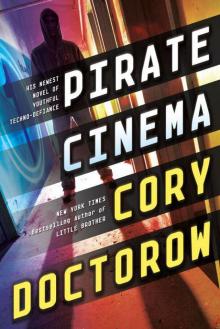 Pirate Cinema
Pirate Cinema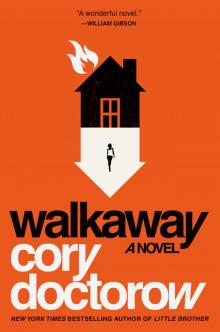 Walkaway
Walkaway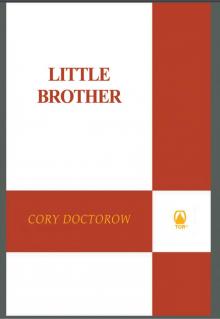 Little Brother
Little Brother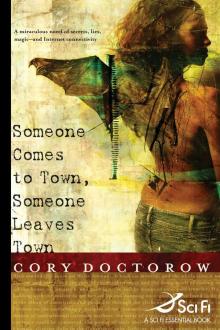 Someone Comes to Town, Someone Leaves Town
Someone Comes to Town, Someone Leaves Town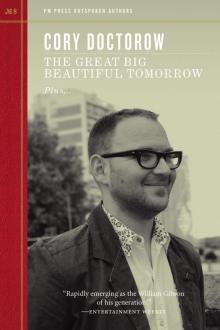 The Great Big Beautiful Tomorrow
The Great Big Beautiful Tomorrow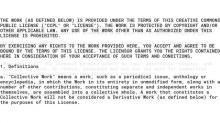 Super Man and the Bug Out
Super Man and the Bug Out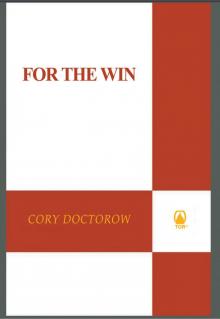 For the Win
For the Win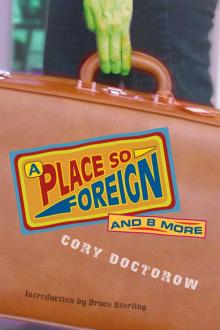 A Place so Foreign
A Place so Foreign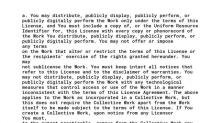 Shadow of the Mothaship
Shadow of the Mothaship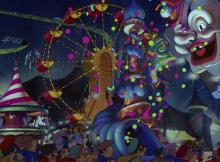 Return to Pleasure Island
Return to Pleasure Island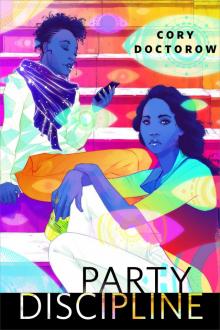 Party Discipline
Party Discipline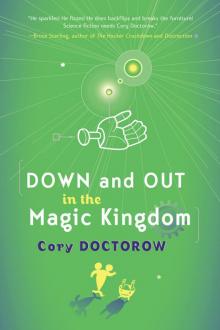 Down and Out in the Magic Kingdom
Down and Out in the Magic Kingdom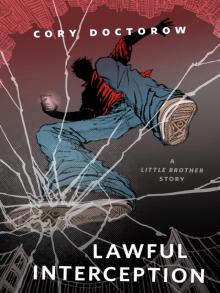 Lawful Interception
Lawful Interception Homeland
Homeland Eastern Standard Tribe
Eastern Standard Tribe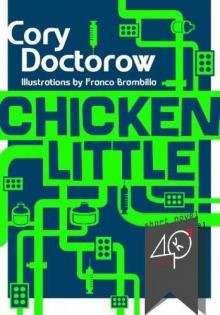 Chicken Little
Chicken Little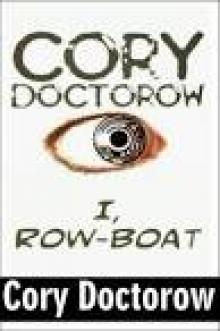 I, Row-Boat
I, Row-Boat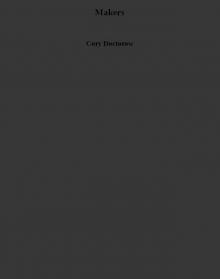 Makers
Makers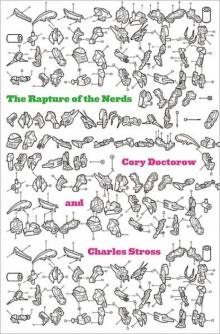 Rapture of the Nerds
Rapture of the Nerds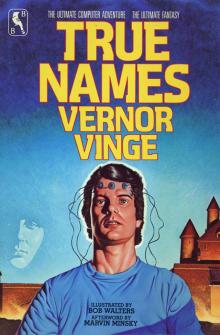 True Names
True Names